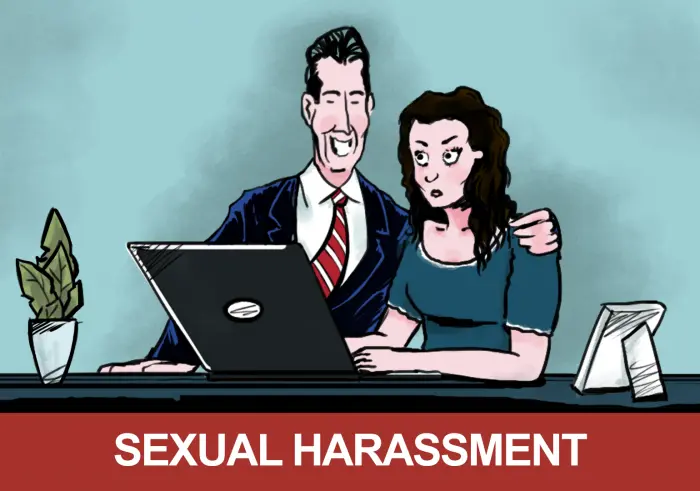What Can You Do About Sexual Harassment in NYC?
Your questions about sexual harassment in the workplace, answered
 Sexual harassment is against the law. But what can you do about sexual harassment in New York City?
Sexual harassment is against the law. But what can you do about sexual harassment in New York City?
If you’ve experienced workplace sexual harassment, NYC laws protect your rights.
In New York, employers have a responsibility to stop sexual harassment in the workplace, and employees are entitled to a harassment-free workplace.
Our FAQ includes step-by-step instructions if you face sexual harassment in NYC. It also explains what qualifies as harassment in NYC and how to contact an NYC sexual harassment lawyer.
What is sexual harassment in NYC?
Workplace sexual harassment includes any unwelcome sexual advances and verbal or physical harassment of a sexual nature.
New York City provides stronger sexual harassment protections for the workplace than any other area. NYC harassment laws cover offensive remarks about a coworker’s sex, demands for sexual favors, and hostile work environments.
Similarly, comments or actions that create a hostile work environment violate the law. In New York City, the New York State Human Rights Law and the New York City Human Rights Law protect workers from unlawful harassment in the workplace. Verbal sexual harassment, such as inappropriate sexual comments or sexual innuendos, can create a hostile workplace.
How are New York sexual harassment laws different?
Federal laws say harassment must be “severe or pervasive” to create a hostile work environment, but New York City laws state that a hostile workplace can be created by behavior that exceeds a “petty slight” or “trivial inconvenience.”
NYC harassment laws also provide stronger protections. For example, the Stop Sexual Harassment in NYC Act, signed into law in May 2018, covers all employees in New York City, regardless of the size of their employer. It also gives victims of harassment up to three years to file a claim.
What standard is used by the courts to determine if a behavior is offensive?
Courts follow the law to decide whether someone crosses the line into offensive behavior.
Sexual harassment laws in New York City apply an expansive definition of a hostile work environment by asking if the behavior is more than a “petty slight” or “trivial inconvenience.” This helps protect employees from harassment at work.
Courts also consider the impact of behavior when determining whether it meets the legal definition of sexual harassment. Some conduct, like sexual assault or obscene graffiti on your desk, is so offensive that it is obviously sexual harassment.
However, even compliments and gifts can constitute sexual harassment if they are unwelcome.
If you are the victim of harassment, keeping records about the harassment and witnesses can help prove sexual harassment to a court.
Which New York State government agency handles complaints of sexual harassment?
In New York State, the New York State Division of Human Rights handles sexual harassment complaints. In New York City, the NYC Commission on Human Rights handles sexual harassment complaints.
You can file a complaint with either agency online or by phone. An NYC sexual harassment attorney can help you through the process.
How to report sexual harassment at work
If you experience sexual harassment at work, take these steps to protect yourself:
- Start taking notes about the harassment. Be as specific as possible, noting the time and place of each incident, what the harasser said or did, and the names of witnesses to the harassment.
- Check your company’s employee handbook for a sexual harassment policy, and follow the procedures outlined.
- Make it clear to the harasser that the conduct is unwelcome, and keep records that show you did.
- Contact your supervisor or human resources department and put your complaints in writing.
- Keep doing a good job at work. Make copies of your job evaluations and evidence of positive feedback, to protect yourself from retaliation.
- Create a sexual harassment log, with all of your complaints and notes about the harassment. Keep a copy at home.
- Seek support from your friends and family. Harassment is stressful, and you may feel alone or isolated. A mental health professional can also help.
- If your company does not stop the harassment or retaliates against you, contact a sexual harassment lawyer to pursue your legal remedies.
Our explainer video offers additional workplace sexual harassment advice.
What can you do about sexual harassment in NYC?
If you experience sexual harassment at work, you may be entitled to compensatory damages, punitive damages, back pay, and other financial settlements.
A sexual harassment attorney can help protect your rights. In New York City, sexual harassment lawyer Charles Joseph offers free consultations. Charles Joseph brings over two decades of experience with sexual harassment cases, and his firm has recovered over $140 million for clients.
You can also read more about your sexual harassment rights:
Sexual Harassment Rights, Laws, and Potential Damages
